The Tin Heart Read online
Page 2
water, which scattered sparklets of light as I went.
Here were people, for the first time since the morning; some scurrying home, late for their dinner, others stopping to talk, others bemused as I was by the lamps and the glimmering lake of the square. I stopped one, an old man in a shabby long coat; he knew a hotel, not too far from here, and cheap; well, inexpensive might have been a better translation. I followed him; he was slow, and in my eagerness I had to stop myself several times from stepping on his dragging coat.
He left me at the door, shouted out for the clerk, and was away down the street before I could thank him. I waited; the reception was that dingy kind you find in Italian hotels of a certain class (or more accurately, not of a certain class). I wondered what time it was, and idly wondered whether I could tell the time by counting heartbeats. The clerk came, took my passport, inspected it, stared at my crabbed cold hands struggling with the check-in form, handed me the key, disappeared. I went up the cold marble stairs, unlocked the door, saw the bed, collapsed.
I was too cold and tired to go out for food, though I hadn’t eaten for a day and a half. I dozed a little, too tired even to take my coat off; woke, and dozed again. The light was still on. It was three in the morning, and everything was silent.
I don’t mean quiet. Quiet in Venice, and you can still hear the rippling of the water, and a stray cat on a roof somewhere, and maybe footsteps three or four streets away. Quiet in a hotel in Venice, and you can still hear the throaty murmur of the boiler, or the gurgle of plumbing, or a clock ticking. Not quiet, then; silent. Silent and deadly.
Silent except for the sound of my own blood in my ears. Silent except for the beating of a heart. Silence broken by the immense sound of blood bursting.
I had the light on and I was still terrified. I tortured myself, thinking; what if it goes out? I put the bathroom light on too, and still felt afeared. I opened the door a slit and looked out into the corridor; there was nothing there, and somehow I would have been less unhappy if there had been. The lights were on and the place was empty, with the cleanliness of the hospital or the morgue.
Still that sound. I hated it. I hated the reminder of my own mortality, that heart that could be stilled by a stab of air, by a mere electrical impulse startled into fatal fibrillation. I hated my own fleshliness. The stranger at midnight stalked me.
I sat through most of the night, wrapping the blankets round my shoulders as a futile prophylactic. Towards dawn, as the air became lighter, as the sounds of a world waking began to reach me, I fell asleep.
The rest of my stay in Venice was uneventful, except for the occasional time I woke in the darkness of the night to a vague, stifled fear. The fog never really lifted; I spent my time inside, in the Basilica, in the Accademia, in the Scuola San Rocco, looking at the fake skies of baroque painting, and never saw the sun.
There was precious little sun in Cambridge either, when I returned. Throughout the damp days I had a prickling feeling, which may have been rheumatism, and then again it may have been something else. I slept badly - but then again, I had never slept well.
Walking along the Backs one day with friends I put my hand into my breast pocket for warmth. It was only then I realised I still had the little tin heart. I’d almost crushed it; my face must have registered my surprise, as Tom said to me, “You look as if you’ve just seen a ghost”. I shrugged it off; but somehow, though I could have explained it easily, I didn’t like to take the ex voto out in front of them all. I was, I suppose, still uneasy about the way I’d acquired it.
Back in my rooms I took the little heart out of my coat and held it gingerly in the palm of my hand. It had tarnished a little, so I breathed on it hotly and rubbed it gently with a corner of my shirt. It seemed somehow as if I were giving life to it; it began to shine, but the blackness of congealed dirt still remained between the filigree ribands of the border, hidden and ineradicable like the dirt under one’s fingernails.
I put it on the mantelpiece. It didn’t look right, somehow. I took it up again and cradled it in my palm, feeling it warm to my touch.
I had a little silver teapot - I don’t have it now; it sprang a leak a couple of years ago and eventually I threw it out - sitting on the table. Acting on impulse, I tucked the little heart into it, tying the ribbon round the little knob on the teapot’s lid in a big bow. There it stayed.
Every so often I would pause from my work and take out the little heart. It always seemed warm now, even when the metal of the teapot was cold. Before I slept, I would hold it again and rub the brightness of it to a shine.
Then one day I found it tarnished, and for all my rubbing and blowing on it I could not make it shine. An iridescent sheen of blue and green and brown had spread from the sharp base of the heart up toward its concave centre, muddying the reflections in it. I imagine I must have rubbed off the thin plating of silver, and the base metal beneath had oxidised irretrievably.
That night I heard my grandfather had died.
I remember standing at the funeral as they lifted the coffin into the earth. I remember thinking how strange it was they made coffins in light wood, not the Dickensian black you always think of. I remember feeling for the little heart I’d put in my breast pocket as a comforter, and I could swear that just as I heard the first earth fall damply against the coffin lid, the heart gave a tiny jump like a starter motor turning over.
I went back to Cambridge both wealthier and poorer, and put the little heart back in its pot.
When I moved to London I took the little heart with me devoutly. One of the first things I did was to hang it up as a mezzuzah, behind the door of the downstairs cupboard where no-one went, in dark and moth infested secrecy. As long as it stayed there I felt at home, safe. I would wake in the night sometimes and go to check that it was still there, my piece of magic against the world.
I met a woman in the dim little office where I worked, reading the hopeless words of still more hopeless authors. I courted her, I married her; I never told her about the heart, and I locked the cupboard where it exercised its silent sovereignty. I went there less often, but still I went there, to see it, to feel it, now as black as a coal. I would tap its hollowness and marvel at the tiny tinny sound. I waited impatiently for her to go out, till the house was free and I could safely take the little heart in my hand again and feel its dark warmth. I amazed myself with the childishness of my ritual but I had neither the desire nor the will to give it up.
Then one day I found a little piece of the filigree broken off. I quizzed her.
“Have you been in the cupboard downstairs?”
“No. Why should I? Anyway, you always keep it locked. What have you got in there - poison?”
“Someone’s been in there,” I insisted; but I couldn’t speak about the heart. It was my secret. Besides, if even I thought the ritual of touching it was childish...
We quarrelled. She left. The little heart had won, and from that moment something had changed. I felt the heart had changed; it had become black, it had become poison.
I started to dream of the church where I found it. I heard heartbeats in my sleep, which started together with mine, but then they began to beat faster, and I could feel my own heart struggling to keep pace, as the beats accelerated madly, and eventually my heart burst in a scatter of red tortures, and I woke. I heard slow heartbeats, footsteps, starting in the darkness of the locked cupboard, and then growing closer, closer and faster till they were nearly upon me.
I began to turn up at work with tired eyes. And my doctor told me I had not insomnia, but a weak heart. I laughed bitterly at the irony.
The day I had my first heart attack I found the little tin heart cracked in two. And I know there had been no-one in the cupboard; no-one but myself had been in the house ever since my wife left.
They were very kind at work, but I could see that my star was now declining. Would I like to work from home, they asked me. Would I like to take some more time away. Would I like to work fewer days a week. An
d my doctor was kind too, but he would not tell me I was healed, he wouldn’t offer me the odds.
So here I am, back in Venice, leaning over the bridge near the Miracoli, with the pieces of the little heart in my hand, pondering. I have only to open my hand and the pieces will fall into the canal, and I shall be free again, though what use my freedom will be I hardly know, I have nothing to do with my freedom after all. But shall I be free? I wonder. If I drop it, will it stop?
About the Author
A M Kirkby writes fantasy, SF, and historical fiction, as well as children's books.

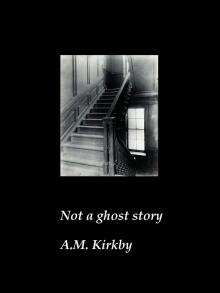 Not a Ghost Story
Not a Ghost Story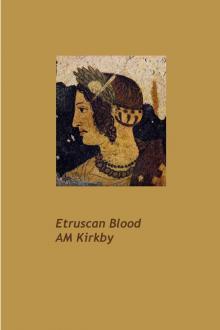 Etruscan Blood
Etruscan Blood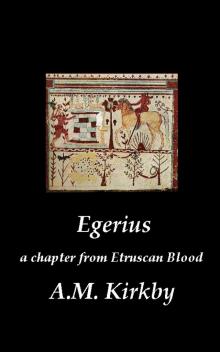 Egerius
Egerius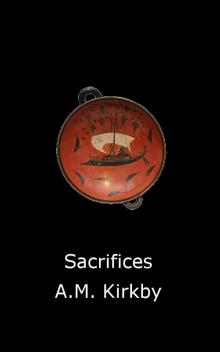 Sacrifices
Sacrifices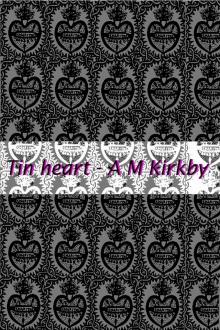 The Tin Heart
The Tin Heart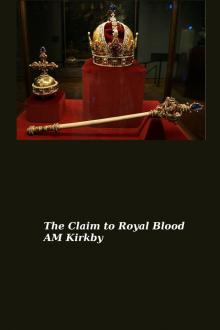 The Claim to Royal Blood
The Claim to Royal Blood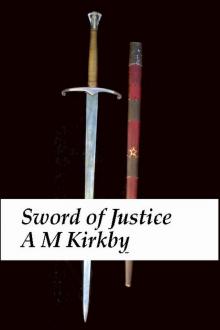 Sword of Justice
Sword of Justice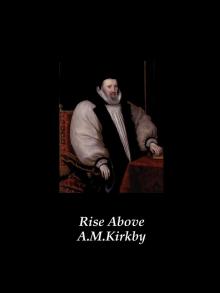 Rise Above
Rise Above